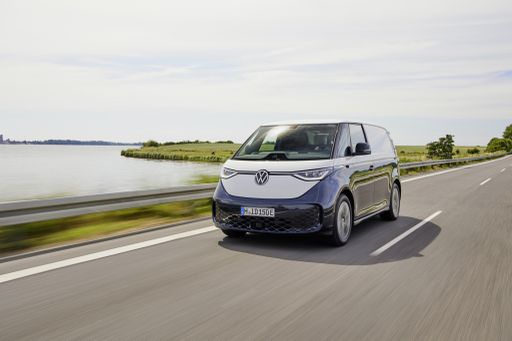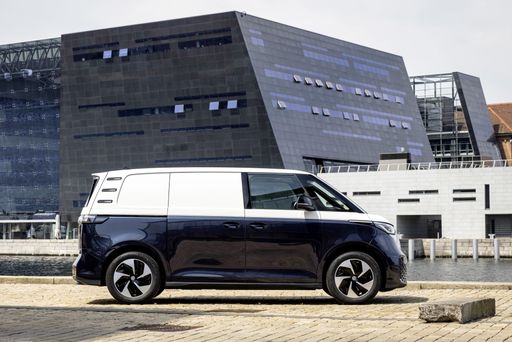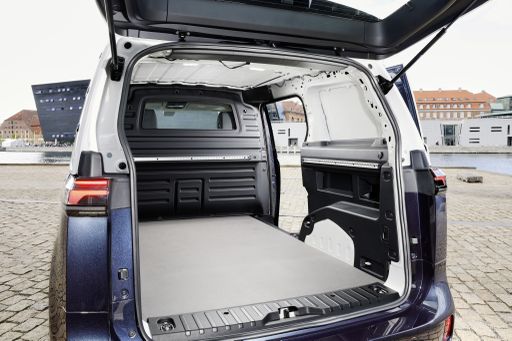Vauxhall Combo Cargo VS VW ID. Buzz Cargo – Specs, Efficiency & Price Comparison
Which model is the better choice – the Vauxhall Combo Cargo or the VW ID. Buzz Cargo? We compare performance (136 HP vs 340 HP), boot capacity ( vs ), efficiency (17.40 kWh5.20 L vs 19.20 kWh), and of course, the price (22400 £ vs 43600 £).
Find out now which car fits your needs better!
The Vauxhall Combo Cargo (Cargo Van) is powered by a Diesel, Petrol or Electric engine and comes with a Manuel or Automatic transmission. In comparison, the VW ID. Buzz Cargo (Cargo Van) features a Electric engine and a Automatic gearbox.
When it comes to boot capacity, the Vauxhall Combo Cargo offers , while the VW ID. Buzz Cargo provides – depending on what matters most to you. If you’re looking for more power, you’ll need to decide whether the 136 HP of the Vauxhall Combo Cargo or the 340 HP of the VW ID. Buzz Cargo suits your needs better.
There are also differences in efficiency: 17.40 kWh5.20 L vs 19.20 kWh. In terms of price, the Vauxhall Combo Cargo starts at 22400 £, while the VW ID. Buzz Cargo is available from 43600 £.
Compare all the key specs now and find out which model fits your lifestyle best!
Vauxhall Combo Cargo
The Opel Combo van is a versatile and practical choice for both businesses and families, offering ample space and comfort. Its efficient design provides ease of manoeuvrability in urban settings, while also delivering a smooth and reliable performance on longer journeys. The interior is thoughtfully equipped with modern features, ensuring a convenient and enjoyable driving experience.
detailsVW ID. Buzz Cargo
The VW ID. Buzz Transporter represents a bold leap into the future with its innovative electric design and retro-inspired aesthetic. Combining practicality with modern technology, it offers a spacious interior and advanced connectivity features ideal for both urban and long-distance journeys. This vehicle stands as a testament to Volkswagen's commitment to sustainability and forward-thinking mobility solutions.
details @ volkswagen-newsroom.com
@ volkswagen-newsroom.com
 @ volkswagen-newsroom.com
@ volkswagen-newsroom.com
 @ volkswagen-newsroom.com
@ volkswagen-newsroom.com

|
|
|
|
|
Costs and Consumption |
|
|---|---|
|
Price
22400 - 34700 £
|
Price
43600 - 51400 £
|
|
Consumption L/100km
5.2 - 6.3 L
|
Consumption L/100km
-
|
|
Consumption kWh/100km
17.40 kWh
|
Consumption kWh/100km
19.2 - 20.3 kWh
|
|
Electric Range
354 km
|
Electric Range
330 - 455 km
|
|
Battery Capacity
-
|
Battery Capacity
59 - 79 kWh
|
|
co2
0 - 143 g/km
|
co2
0 g/km
|
|
Fuel tank capacity
53 - 61 L
|
Fuel tank capacity
-
|
Dimensions and Body |
|
|---|---|
|
Body Type
Cargo Van
|
Body Type
Cargo Van
|
|
Seats
2 - 6
|
Seats
3
|
|
Doors
4 - 5
|
Doors
4
|
|
Curb weight
1329 - 1813 kg
|
Curb weight
2264 - 2510 kg
|
|
Trunk capacity
-
|
Trunk capacity
-
|
|
Length
4401 - 4751 mm
|
Length
4712 mm
|
|
Width
1848 mm
|
Width
1985 mm
|
|
Height
1820 - 1825 mm
|
Height
1932 mm
|
|
Payload
611 - 991 kg
|
Payload
640 - 753 kg
|
Engine and Performance |
|
|---|---|
|
Engine Type
Diesel, Petrol, Electric
|
Engine Type
Electric
|
|
Transmission
Manuel, Automatic
|
Transmission
Automatic
|
|
Transmission Detail
Schaltgetriebe, Automatikgetriebe
|
Transmission Detail
-
|
|
Drive Type
Front-Wheel Drive
|
Drive Type
Rear-Wheel Drive, All-Wheel Drive
|
|
Power HP
102 - 136 HP
|
Power HP
170 - 340 HP
|
|
Acceleration 0-100km/h
11.20 s
|
Acceleration 0-100km/h
-
|
|
Max Speed
135 - 183 km/h
|
Max Speed
145 - 160 km/h
|
|
Torque
205 - 300 Nm
|
Torque
310 - 679 Nm
|
|
Number of Cylinders
3 - 4
|
Number of Cylinders
-
|
|
Power kW
75 - 100 kW
|
Power kW
125 - 250 kW
|
|
Engine capacity
1199 - 1499 cm3
|
Engine capacity
-
|
General |
|
|---|---|
|
Model Year
2024
|
Model Year
2024
|
|
CO2 Efficiency Class
E, A
|
CO2 Efficiency Class
A
|
|
Brand
Vauxhall
|
Brand
VW
|
Vauxhall Combo Cargo
Discovering the Opel Combo: A Compact Van with Big Capabilities
The Opel Combo is a standout in the realm of compact vans, offering a blend of practicality, efficiency, and advanced technology. Whether you are a small business owner in need of a reliable transport solution or an eco-conscious driver looking for a green alternative, the Opel Combo has something to offer. Let's delve into the technical details and innovations that make this van a noteworthy contender in its class.
Engine Options: Flexibility Meets Efficiency
The Opel Combo boasts a wide range of engine options to cater to various driving needs. Available in both diesel and petrol, as well as electric versions, the Combo offers a versatile selection of powertrains. With engine power ranging from 102 PS to an impressive 136 PS, the Combo ensures that you have enough oomphto get the job done.
The diesel variants present efficient fuel consumption statistics, with figures between 5.4 to 5.9 L/100 km, ensuring fewer stops at the fuel station. Meanwhile, the electric models offer an attractive alternative with a range of 326 to 336 km on a single charge, emphasizing Opel's commitment to sustainable mobility.
Innovative Technology: A Step Forward
Innovation in the Opel Combo is not just limited to its engines. It incorporates state-of-the-art features designed to enhance the driving experience. Automatic transmission options provide smooth gear transitions, reducing driver effort and fatigue, especially in urban settings. A key technological highlight is the inclusion of advanced driver assistance systems which enhance safety and ease of use.
The Combo's infotainment system is equipped with all the modern connectivity options, making it easy for users to stay connected on the go. With intuitive controls and an ergonomic layout, the system enhances the overall driving experience by keeping essential functions accessible at all times.
Design and Practicality: Structured for Success
Opel has masterfully balanced form and function in the Combo's design. With a compact exterior measuring between 4401 to 4753 mm in length, the Combo is perfect for navigating urban environments without sacrificing cargo space. The van offers a generous payload capacity of up to 916 kg, demonstrating its ability to handle demanding logistical tasks.
Inside, the Combo provides comfort and practicality with seating configurations ranging from 2 to 6 seats. This flexibility makes it ideal for both goods transport and ferrying staff. With a maximum speed of up to 184 km/h, the Combo ensures timely deliveries while maintaining Opel's standard for safety and efficiency.
Environmental Considerations: Efficient and Responsible
The Opel Combo manages to balance power and environmental responsibility efficiently. CO2 emissions range from 0 for electric variants to a moderate 155 g/km for certain diesel configurations. These figures demonstrate Opel's dedication to reducing the environmental footprint of its vehicles.
Moreover, the Combo Electric models, with energy consumption as low as 18.6 kWh/100 km, prove that Opel is committed to offering cleaner, alternative fuel vehicles that meet modern environmental standards.
Conclusion: A Compact Van That Packs a Punch
The Opel Combo emerges as a versatile and innovative choice in the compact van segment, blending efficiency, technology, and practicality seamlessly. For those searching for a reliable partner in business or an eco-friendly transport solution, the Combo stands out as a compelling choice. With a price range that accommodates various budgets, the Opel Combo deserves serious consideration from anyone in need of a robust yet refined transport solution.
VW ID. Buzz Cargo
Reimagining the Classic: The VW ID. Buzz Transporter
The automotive industry has recently been inundated with a range of electric vehicles (EVs), but few can claim a lineage as iconic as the Volkswagen ID. Buzz Cargo. A modern-day reimagining of the classic VW Microbus, the ID. Buzz Transporter seamlessly blends nostalgia with cutting-edge technology and sustainable performance.
Power Meets Precision: Performance and Efficiency
Available in multiple configurations, the ID. Buzz Transporter offers both rear-wheel drive and all-wheel drive options. The base model features an impressive 286 horsepower and a respectable electric range of 461 km, thanks to its 19.2 kWh consumption per 100 km. For those who crave more power, the all-wheel-drive model ups the ante with a thrilling 340 horsepower and a range of 432 km, facilitated by its slightly higher 20.3 kWh/100 km consumption.
Both versions rely on an efficient reduction gearbox, ensuring a smooth and automatic driving experience. The rear-wheel-drive's entry-level model provides a more accessible point for EV enthusiasts with 170 horsepower and an overall easier handling package.
The Heart of an Electric Revolution: Battery and Range
Power comes from robust battery configurations that reflect VW's commitment to sustainable performance. The ID. Buzz Transporter boasts a 79 kWh battery in its higher-end models, allowing expansive commutes or work-related travels. Meanwhile, the 59 kWh option offers a reduced footprint, without substantially compromising on performance, to align perfectly with its more entry-level 170 HP variant.
Functional Innovation: Design and Practicality
While the exterior design pays homage to its retro predecessor, the four-door ID. Buzz is all about embracing modern interior design. The cargo van accommodates up to three seats, making it not only a style statement but a practical choice for businesses needing a workhorse with a zero-emission output.
Weighing in at a curb weight range from 2264 kg to 2510 kg, depending on the model chosen, the vehicle is a testament to Volkswagen's focus on durability and reliability. Despite its weight, the ID. Buzz delivers a payload ranging from 640 kg to 753 kg, maintaining crucial cargo efficiency.
Sustainability Meets Technology: Features and Future Outlook
Volkswagen intentionally integrated forward-thinking technology into the ID. Buzz, emphasizing zero emissions with a CO2 rating of 0 g/km and maintaining an A-grade CO2 efficiency class. These advancements, paired with a maximum speed of 160 km/h and an impressive torque (ranging from 310 Nm to 679 Nm based on the selected variant), set a new standard for electric utility vehicles.
Conclusion: A Symbol of Tomorrow, Today
The ID. Buzz Transporter signifies VW's earnest step into the future while paying homage to its rich heritage. Priced between €50,825 and €59,922, the vehicle caters to a range of consumers looking for a versatile and eco-friendly solution without sacrificing quality or style. With its innovative engineering and nostalgic charm, the ID. Buzz Transporter is poised to capture the imagination of both traditional VW fans and new EV adopters in 2024.
The prices and data displayed are estimates based on German list prices and may vary by country. This information is not legally binding.
